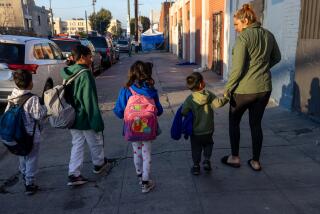BOYLE HEIGHTS : Homeless Shelter for Families Reopens
- Share via
Araceli Tavares, 19, and her 17-month-old daughter had been looking for a place to live for the past month.
They found it Tuesday at the Dolores Mission’s Casa Miguel Pro homeless shelter, becoming the newest tenants since the shelter closed four months ago for asbestos removal.
Now, Tavares hopes to find day care for her child so she can enroll in school to learn English.
The shelter, named after Miguel Augustin Pro, a Mexican priest who helped the poor in the 1920s before he was killed by the Mexican army, has assisted families like Tavares’ since 1989.
Located at the Dolores Mission School, its rooms hold twin beds and a closet. Bathrooms and showers are down the hall, and a large kitchen holds an antique stove where families can take turns cooking dinner for other occupants.
The shelter, which can accommodate up to 26 people, was reopened with the help of a $5,000 Nancy Chandler Memorial Award grant from Lucky Stores and the Food for All Program, a nonprofit organization that uses donations from grocery store customers to fight hunger in low-income communities.
Many of those who helped paint the cupboards and walls, clean the floors and wash the windows were on hand for the reopening celebration Dec. 16.
“We do a lot of work here,” said volunteer Rosa Ramos, who lives in the Aliso Village housing project and is a member of the church’s Comite Pro Paz, which works with gang members to bring peace to the neighborhood. “We’ll do different things because it’s all for the same community.”
“The same people who (worked on the shelter) do other things in the community,” said Teresa Zarate, a church employee who runs the shelter with co-worker Javier Perez. “The goal is to support them.”
Need for the shelter has grown over the years.
After the federal Immigration Reform and Control Act of 1986 gave amnesty to people who had been in the United States illegally, many families in the Pico-Aliso neighborhood were besieged by relatives for a place to stay. But because many of them live in the housing projects, where more than one family are prohibited from staying in each apartment, they needed the shelter, Zarate said.
In 1987, the Dolores Mission declared itself a sanctuary for Central American immigrants fleeing wars in their countries. In addition, the church began opening its doors to homeless men, who rest on pews and are fed each night by members of the community.
“That was not an easy decision,” said Georgianna McBurney, chairwoman of the Food for All advisory board. “The courage it took was there and the faith it took was there.” The church now houses 90 to 100 men each night.
Families, who are referred to the Casa Miguel Pro shelter across the street from the church by other social service agencies or who simply show up at its doors, stay for an average of four months while they look for jobs and find permanent housing, Zarate said.
“This place will provide food and shelter, but more than anything else, hope,” said Grover L. McKean, chairman of the board of Proyecto Pastoral.
Hope and shelter is what Rebecca Garcia received when she stayed at the shelter before it closed in August.
As her two boys ran around, carrying balloons, Garcia took in the third-floor patio.
Tears came to her eyes as she remembered what her family of four had gone through, being returned to Mexico by the Border Patrol three times and having to raise $850 to pay smugglers. The family finally crossed the border four months after they set out from Nicaragua and eventually ended up at the Dolores Mission shelter. They stayed six months, receiving food, shelter and information on government-subsidized housing, before leaving when the shelter was closed for the asbestos removal.
“I’ll never forget this place because they helped me so much,” said Garcia, whose family now lives in a house in Hacienda Heights.
More to Read
Sign up for Essential California
The most important California stories and recommendations in your inbox every morning.
You may occasionally receive promotional content from the Los Angeles Times.










